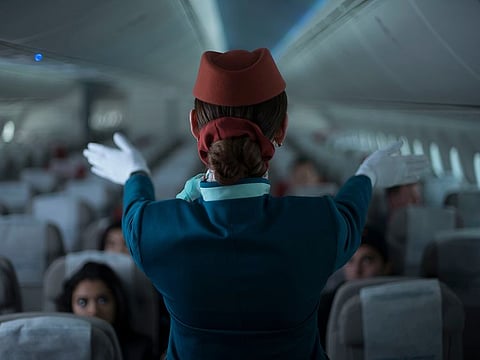Airline cabin crews cannot operate well in command-and-control mode
True leadership in the air is not in-flight managers shouting at crew

On a recent flight from Manchester to Singapore on an A350900 under registration SQ301, I witnessed something that left a far greater impact than any in-flight experience ever has - though not in the way one might expect. It wasn’t a technical fault or service failure.
The aircraft arrived on time. The food was satisfactory. The Premium Economy seat was as comfortable as always.
No, what struck me wasn’t what went wrong at the surface - it was the silent resilience of a crew operating under visible emotional duress, and the loud failures of leadership behind the curtain.
True leadership is not about exerting authority. It is about enabling excellence. What I observed was a textbook case of what happens when authority is confused for leadership, and when power is exercised without empathy.
The in-flight manager, a senior figure entrusted to steward the crew and protect the passenger experience, behaved in a manner wholly inconsistent with the ethos of the airline. Throughout the flight, he yelled at and demeaned junior crew in the galley, within earshot of multiple passengers.
The tone was aggressive, the volume unnecessary, and the criticisms were simply untrue. In fact, the lavatories were spotless, the service refined, and the morale among the crew remarkably intact given the hostile environment.
This incident speaks to a broader truth: service excellence is not just about procedures and polish - it’s about culture, and culture lives or dies by the quality of leadership. Especially on the frontlines.
Service as strategic asset
We often remind clients that frontline employees are not just brand representatives - they are the brand. According to McKinsey, 70% of a customer’s journey is shaped by how they feel they’re being treated. Similarly, ‘Harvard Business Review’ notes that organizations with high levels of employee engagement see customer loyalty increase by up to 10% and profitability by 21%.
This correlation is particularly critical in aviation, an industry where product differentiation is narrow, and customer memory is long. In a hyper-competitive market where digital convenience is commoditized, human service remains a strategic differentiator.
Leadership Is not optional
Leadership at 35,000 feet is complex. There is no room for ego. The best in-flight managers are quiet stewards, enabling crew to shine while remaining alert to the customer journey and operational flow.
The concept of ‘servant leadership’, coined by Robert Greenleaf in the 1970s, is more relevant than ever in frontline service environments. The leader is there to serve the team. When practiced effectively, empowered employees deliver exceptional service.
Sadly, what I observed was ‘command-and-control management’, devoid of emotional intelligence. While it may have appeared to ensure discipline, it actually risked the opposite: disengagement, attrition, and quiet quitting. Gallup reports that only one in three employees globally feel engaged at work, and poor management is the leading cause.
Empowerment in action
What redeems this story - and offers hope - is the performance of the crew. Despite the emotionally charged environment, they remained composed, committed, and deeply professional.
They maintained warm service with genuine smiles, tending to both comfort and detail. Their conduct, while commendable, also raises an uncomfortable truth: many frontline employees succeed despite their leaders, not because of them.
Final descent
We often think of turbulence in the skies as a technical phenomenon. But cultural turbulence - caused by leadership failures - can be far more destabilizing to an airline’s long-term competitiveness.
If airlines want to maintain service excellence as a competitive advantage, then they must treat leadership development as a strategic priority, not a soft skill. It starts with one simple truth: people don’t leave bad jobs - they leave bad managers.
In the sky, just as on the ground, passengers can tell the difference.
Sign up for the Daily Briefing
Get the latest news and updates straight to your inbox


